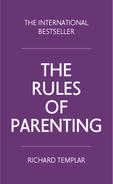RULE 37
Don’t be a nag
I read a very interesting piece recently about someone who had been researching into nagging (I wonder how many times they had to be asked). They discovered that if you nag people, they’re actually less likely to do what you want than if you don’t.
So how do you get your kids to do things if you don’t nag? Well, nagging has a tone to it that implies irritation and that’s what’s so off-putting about it. And when nagging gets really bad – and this is something Rules parents make sure they never do – you nag children about what they are rather than simply about what they do. So ‘You didn’t shut the door’ is a reasonable reprimand, but ‘You never shut the door’ is a nag. Even worse is condemning their natural character: ‘You never think about anyone else’ or ‘You’re just clumsy.’ If you do this to your kids, you’ll make them worse. And who can blame them?
But there’s no need to use any irritable tone or personal phrases. All you have to do is ask firmly, and make it clear what will happen if they don’t do it. Like this: ‘Please do your homework. If it isn’t done by 6 o’clock I’ll have to turn the computer off until you’ve done it.’ Then keep quiet until 6 o’clock and, if necessary, turn off the computer. If this is your standard approach, it won’t take long for your kids to realize you’re not joking.
I visited someone’s house once for lunch, and the kitchen table where we were going to eat was covered in children’s toys, drawings, sweets, Lego bricks, playing cards and general assorted trash. I offered (somewhat nervously) to clear it. ‘Oh no,’ replied my host, ‘there’s no need. The children will do it’. I wondered how on earth she was going to get the kids to clear the table before the vegetables came to the boil when they were engrossed in something else, but she went to the kitchen door and called cheerfully, ‘Everything that’s still on the kitchen table in 10 minutes is going in the bin!’ Clearly used to this – and clearly having been persuaded at some time in the past that she wasn’t bluffing – the children all appeared instantly and five minutes later the table was ready for lunch. No nagging – she just said it once and made sure they knew what would happen if they ignored her.
There’s something else worth saying about nagging, and that is that children go through a long period of several years where they can do certain jobs but it’s not reasonable to expect them to remember it for themselves. So instead of being cross that your child has forgotten yet again to feed the hamster, and being tempted to nag them, it’s much happier all round if you regard it as part of the deal that they feed the hamster but it’s your job to remind them to do it. Now you just need someone to nag you to remember.
THERE’S NO NEED TO USE
ANY IRRITABLE TONE OR
PERSONAL PHRASES
